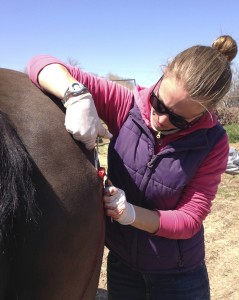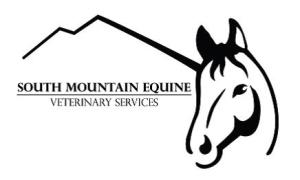 Think biosecurity is just for commercial barns? It depends.
Think biosecurity is just for commercial barns? It depends.
By Kate Schoenhals
South Mountain Equine
Walking down the barn aisle to your new horse’s stall, you hear a dry cough and notice your horse has green discharge coming from both his nostrils as does his neighbor. Because his previous owner was unable to provide medical records, you are unsure of your horse’s vaccination history. Too concerned to ride, you have your vet out for a visit and tests confirm – your horse has the flu!
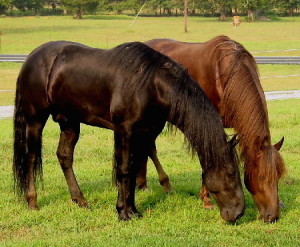 The good news is, many highly contagious illnesses, such as influenza, are not lethal and may require little to no treatment. The bad news, however, is that these diseases are often indistinguishable from other more serious and/or life-threatening diseases without specific lab testing. These tests, which are unfortunately both necessary and expensive, aim to determine the cause of an infection and/or an outbreak as well as dictate an appropriate means of treating the disease as well as limiting its spread to other animals and barns.
The good news is, many highly contagious illnesses, such as influenza, are not lethal and may require little to no treatment. The bad news, however, is that these diseases are often indistinguishable from other more serious and/or life-threatening diseases without specific lab testing. These tests, which are unfortunately both necessary and expensive, aim to determine the cause of an infection and/or an outbreak as well as dictate an appropriate means of treating the disease as well as limiting its spread to other animals and barns.
Infectious diseases affect each horse differently based on three variables:
- the horse’s ability to resist disease (immunity)
- the infectious agent at play (bacteria, virus, parasite, etc.)
- the environment.
When a horse is sick at a barn, reducing the transmission of infection could mean the difference between an isolated case and an epidemic. The amount of time a sick horse (and/or a barn) needs to be quarantined and whether to administer an 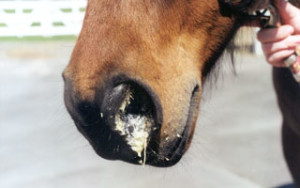 appropriate vaccine or treatment regimen (if any) will depend on what infectious agent is involved. These management practices and procedures are referred to as “biosecurity.”
appropriate vaccine or treatment regimen (if any) will depend on what infectious agent is involved. These management practices and procedures are referred to as “biosecurity.”
Most equine boarding facilities and show arenas have inherent challenges when it comes to disease control. There are a number of factors unique to the horse world. These include, but are not limited to: the constant traffic and travel to and amongst barns (by both people and their horses), close quarters in which horses are often housed, inadequate or non-existent isolation areas, poor manure management, and/or varying preventive health protocols (vaccines, deworming, vet checks, etc).
ANYTHING that touches an infected horse or carries secretions or manure from sick horses has the potential to transfer agents to other horses. The following is a list of recommendations to help ensure the health of your horse and reduce risk of exposure and spread of infectious agents:
Recommendations when considering biosecurity:
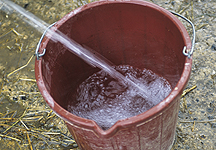 Disinfect stalls and surfaces of areas where other horses with unknown vaccination and health history have been housed before exposing your horse.
Disinfect stalls and surfaces of areas where other horses with unknown vaccination and health history have been housed before exposing your horse.
Do not use communal water sources or equipment. Bring your own water buckets, feed bins, grooming supplies, tack, wheelbarrows, shovels, rakes, etc. and avoid sharing with other horses and people.
Thoroughly clean your equipment if it has been used by other horses/people. Disinfection can be achieved with the use of 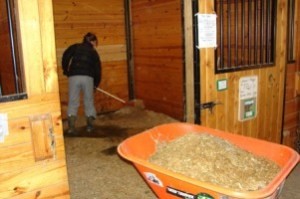 household products such as common detergents and soaps, washing soda, household chlorine bleach, hypochlorites, swimming pool disinfectant and citric acid. Check concentration and exposure times on the label.
household products such as common detergents and soaps, washing soda, household chlorine bleach, hypochlorites, swimming pool disinfectant and citric acid. Check concentration and exposure times on the label.
Vaccinate your horse to protect them from preventable diseases.
Remove manure frequently and regularly. Store manure and soiled shavings/bedding away from any area with foot traffic.
Wash hands between contact with different horses. Frequent hand washing has been proven to be the most important component in prevention of spread of infectious diseases.
Monitor your horse closely for any signs of illness, especially within three weeks of possible exposure to infectious agents/other horses/unknown environments.
Report horses that appear ill or have a high temperature to the appropriate supervisor in your barn. Contact your veterinarian as soon as possible.
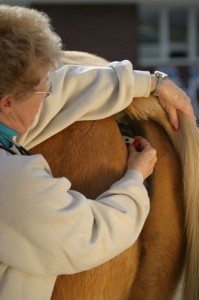 What to watch for:
What to watch for:
General signs of illness to watch for include but are not limited to: fever (rectal temperature greater than 101F), colic, lethargy, nasal discharge, cough, diarrhea, mouth ulceration, lack of appetite, depression, sudden changes in behavior/attitude, and lack of coordination.
There is no need to panic in the event of a suspected contagious illness. The best thing to do is stay calm, wash your hands and contact the barn manager as well as your veterinarian as soon as possible. The earlier an illness is caught, the sooner it can be treated and the less time it will have to spread.
